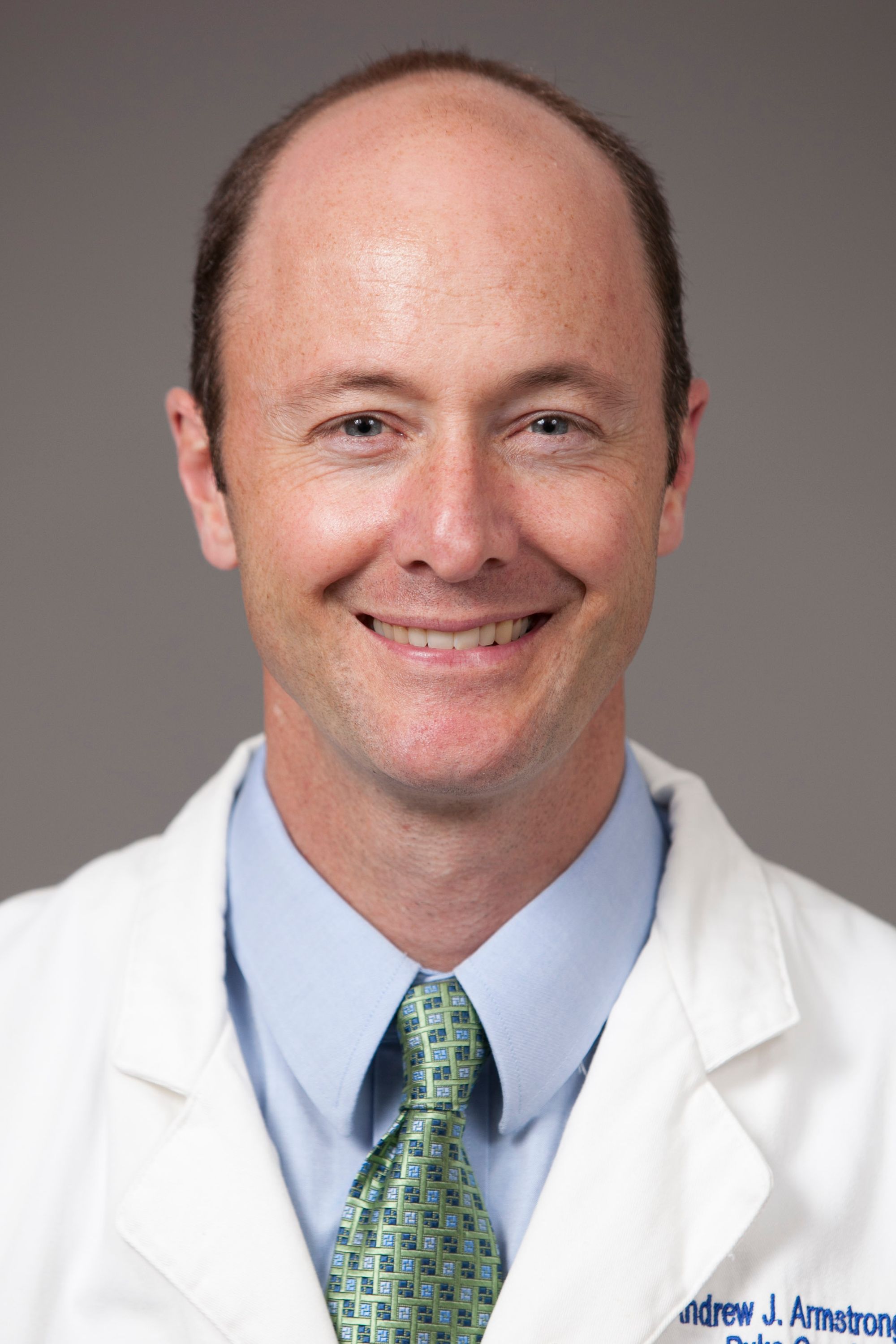Expert Spotlight: Dr. Andrew Armstrong

Dr. Andrew Armstrong earned a BS in Biomedical Engineering from Duke University, an MD degree from the University of Virginia, and an MSc in Clinical Investigation from Johns Hopkins University. He completed a Medical Oncology Fellowship at Johns Hopkins University and is currently a full Professor of Medicine and Surgery, Pharmacology and Cancer Biopsy at Duke University, and is the Director of Research for the Duke Cancer Institute’s Center for Prostate and Urologic Cancers.
Initially wanting to advance research in the laboratory through science and technology innovations, Dr. Andrew Armstrong entered academia as a biomedical engineer student at Duke University. But struck with the realization that he loved communicating with and taking care of patients as well as translating scientific advances directly to patients, he added pre-med classes and enrolled in medical school at the University of Virginia, completed internal medicine residency at Penn, and completed fellowship training at Hopkins in medical oncology.
Dr. Armstrong's focus in GU oncology, and prostate cancer specifically, didn't arise until his fellowship at Johns Hopkins, where he came under the mentorship of Dr. Michael Carducci, the AEGON Professor in Prostate Cancer Research. Dr. Armstrong credits the strong program and mentor there for his interest in prostate cancer treatment and research:
"we're living at an exciting time, where prostate cancer has one of the highest rates of survivorship in America. Even for men with advanced disease, current therapies are allowing men to survive for longer while maintaining good quality of life; and this impact is both rewarding as a career, but also offers many avenues for research to build upon this success for our patients. For GI oncology as a whole, there have been amazing advances in kidney and bladder cancers in terms of immunotherapies and other approaches, and a dramatic increase in cure rates for testicular cancer among young people."
The successful results of trials and patient testimonials have been among the most gratifying moments for Dr. Armstrong throughout his career. There is still much work to be done, however.
"We can control metastatic disease to some extent, but the majority of men with stage IV prostate cancer will succumb to their disease. Since the introduction of targeted immunotherapies, some stage IV cancers have been treated left and right, but not all; prostate cancer tends to be one of those cancers that does not respond well to traditional immune checkpoint blockade. That is the focus of the lab I direct: to understand and overcome prostate cancer."
Dr. Armstrong also believes there are institutional issues that prevent patients from accessing quality care: "for instance," he elaborates, "prostate cancer disproportionately affects African American men, so we need to make more of an effort to be inclusive and ask relevant questions. Many drugs, by way of example, are approved by the FDA without including trials for the patients that are going to most affected by that drug. That needs to be remedied."
With all the obstacles to overcome, Dr. Armstrong is still hopeful about the direction that oncology research is headed in. "I'm looking forward to seeing new approvals of precision-guided approaches in medicine. Different subtypes of prostate cancer are defined by their mutations such as DNA repair alterations, and those currently require very selective approaches. Very slowly we are learning how to broaden the attack. In the future, we'll see drug schedules moving up earlier to improve cure rates and prevent metastatic disease."
Cancer remains the number two cause of death in the United States by percentage, and prostate cancer is the second-leading cause of cancer death among men in the United States. However, from 1993 to 2016, prostate cancer deaths fell by more than 50%. Dr. Armstrong adds, "oncology is where most advances of health and human disease is happening right now. There is much more opportunity to make a difference in oncology than anywhere else."
Innovations such as theMednet are helping physicians inform their treatment and care for their patients. "It has been useful to explore the gaps of medical knowledge in a way that is practical. Not every patient scenario fits perfectly into a clinical trial or is remedied by those trials, and that's where theMednet works to provide the most evidence-based answer from top experts."
Outside of his lab, Dr. Armstrong is an avid hiker and explorer. His current goal is to visit all of the national parks of the United States. So far, he's made it through 20% of them! His favorite park, Lake Clark National Park and Preserve, is a hidden oasis 100 miles southwest of Anchorage, Alaska, with no roads; it's one of the only places one can find wild grizzly bears. He is married to a pediatrician, and has 3 children who always keep him on his toes, and emphasize the need for work life balance.
